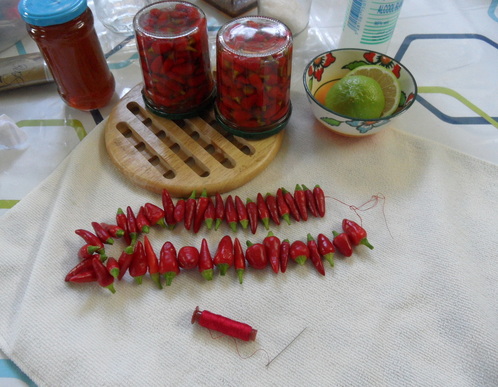| Submitted by Alexis Baghdadi This time of year (July-August) marks the harvest season of red hot chili (or chile, or chilli) peppers in Lebanon. If you are into intense sensations, you can eat your raw peppers right off the plant. But you can also preserve your harvest to last you the whole year as pickles or dry pepper. Red hot chili peppers (I recently learned they are in fact tabasco peppers - Capsicum frutescens - and quite common in Lebanon), are some of the food plants that grow well in my small garden in Ashrafieh - Beirut. For the past 4 years, I have had a good harvest every summer, so I end up making presents of pickled tabasco peppers to those of my friends who can "take the heat". | |
If you don't have your own pepper plants (yet), this might encourage you to start growing them in your garden or on your balcony. Plants are available in most local plant nurseries, or you can grow them from seed. Here is a good online guide I found for growing peppers indoors or in pots: http://s14.zetaboards.com/TGTA/topic/6732251/1/)
Pickled peppers
What you'll need (adjust quantities as necessary):
-Red peppers
-300 gm sea salt (coarse or ground)
-2 liters of water
-1 liter of vinegar
-1 pan + jars
Pick you red peppers fresh (they should be red and firm) then wash them in water on the same day. Allow the peppers to dry on a newspaper or towel indoors (you can place them under a fan). Remove any leaves or long stems.
Dilute the sea salt in water and bring it to a boil. Allow the salt water to cool down to room temperature then mix in the vinegar; you now have a basic pickling solution you can use for a variety of vegetables.
Get a sterilized jar for your peppers. An easy way to sterilize a jar is to wash it thoroughly then rinse it well. Place your jar in the microwave for a minute or until all traces of water evaporate. Remove the jar from the microwave (Warning: use kitchen gloves as the glass will be very hot) and allow it to cool down a little.
Place your peppers inside a sterilized jar (try to fill it to the top, shaking the jar and pressing the peppers down gently). Some people like to add herbs, garlic cloves, green almonds or small onions to their pickled peppers for extra flavor - go ahead and experiment or keep it simple with peppers only. Add the pickling solution in the jar so as to cover the peppers entirely (the peppers will float to the top, so you can cover them with a slice of lemon to keep them down.
Close your jar tightly then place it in a pan with water. Bring the water to a boil then remove the jar and place it upside down to cool. This will prevent air bubbles from forming inside. When you jar has cooled down, place it in an upright position in a cool dark place away from sunlight. You should wait at least 1 week for your peppers to pickle before opening the jar. Once open, you can keep the jar in a cool dry place or refrigerate it for extended periods. Your pickled peppers should last 1 year or more if you used well-sterilized jars and store them carefully.
Tip: Do not throw away any excess pickling solution. You can store it in a sterilized jar in a cool dark place for future pickles
Dried peppers
After I finished pickling my tabasco peppers, I had a few left over that weren't enough to fill even a small jar, so I decided to dry them. They can still be used for cooking afterwards, but I personally use them to make chili-flavored olive oil (it tastes great with pizza or baked potatoes).
What you'll need:
-Red peppers
-Needle and thread (preferably a strong thread or fishing line)
Sterilize a sewing needle by burning its tip and wiping it with alcohol. Thread the needle with a strong thread or fishing line (I didn't have any fishing line or strong thread, so I used a double line of regular sewing thread). Run the needle and thread through the center of each pepper. When you're done, make a loop and tie it so it looks like a necklace.
Hang your pepper necklace in a dry, ventilated place away from direct sunlight (or cover it with a newspaper) for about a week until the peppers start to dry. Store your dry peppers inside an airtight container (like a jar) in a cool dark place. Dried peppers should last 1 year or more if stored correctly.


